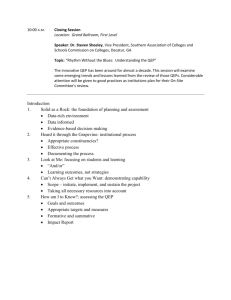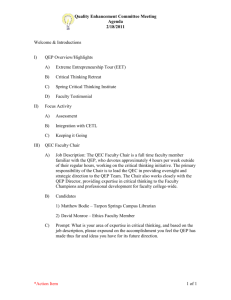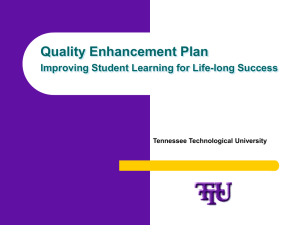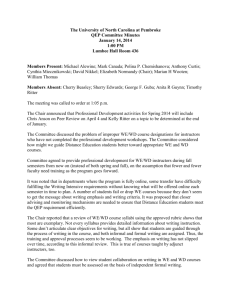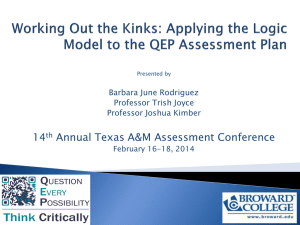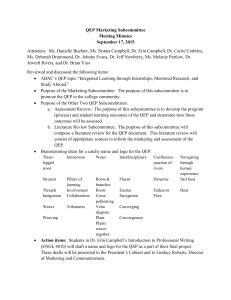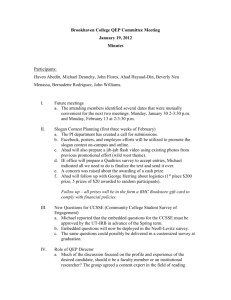presentation slides - University of New Orleans
advertisement
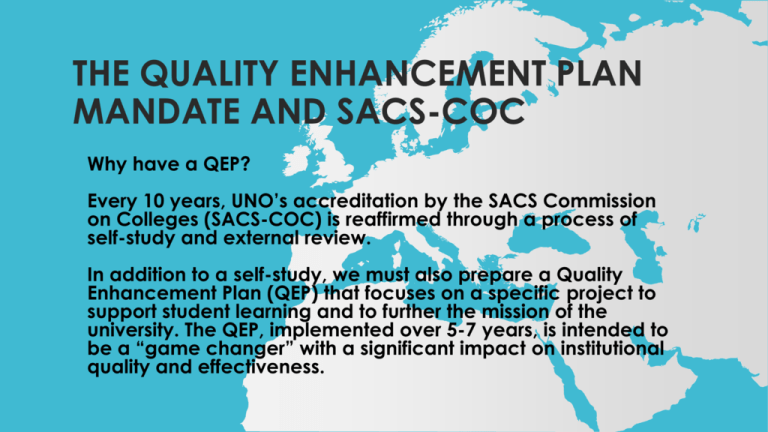
THE QUALITY ENHANCEMENT PLAN MANDATE AND SACS-COC Why have a QEP? Every 10 years, UNO’s accreditation by the SACS Commission on Colleges (SACS-COC) is reaffirmed through a process of self-study and external review. In addition to a self-study, we must also prepare a Quality Enhancement Plan (QEP) that focuses on a specific project to support student learning and to further the mission of the university. The QEP, implemented over 5-7 years, is intended to be a “game changer” with a significant impact on institutional quality and effectiveness. PICKING THE TOPIC January 30, 2014: President Fos appoints a QEP Topic Selection Committee and issues a call for topics. 7 topics are proposed by various UNO academic units. UNO holds 45 days of discussion of the topics at open forums and a campus wide poll to determine the one that will be chosen. April 15, 2014: President Fos announces the topic and names QEP committee members and issues their charge. THE CHARGE April 15: President Fos announces that the QEP topic will be “Global Engagement, . . . and professional communication, with the potential for a measure of general education reform.” The topic is relevant to and aligned with our strategic plan, UNO 2020, and it will allow for a measure of general education reform through the possible addition of globally-focused courses. THE COMMITTEE MEMBERS President Fos appoints the QEP Committee, made up of faculty and staff from units representing the entire campus: The Executive Committee Chair: John Hazlett Director, BA in International Studies Program Professor, Dept. of English Vice-Chair: Steve Striffler Director, Zemurray Stone Center for Latin American Studies Professor, Dept. of Anthropology Secretary: Alea Cot Assistant Vice President for International Education, Division of International Education Scribe: Peter Schock Chair and Professor, Dept. of English Consultant: Leslie Culver Program Director, Institutional Effectiveness, Academic Affairs Consultant: Bill Sharpton Associate Provost and SACS Liaison, Academic Affairs Student Rep: In process THE COMMITTEE MEMBERS Subcommittee on Student Learning Outcomes: Chair: Bhaskar Kura Chair and Professor, Dept. of Civil & Environmental Engineering Vice Chair: Dale O’Neill Student Involvement & Leadership Secretary: Toni Slessinger Admissions Counselor, Enrollment Services Rasheed Azzam Distinguished Professor, Dept. of Electrical Engineering Alea Cot Assistant VP for International Education, Div of International Ed Christy Heaton Assoc Director for Operations & Programs, Enrollment Services Zhengchang Liu Associate Professor, Dept. of Biology Ting Wang Professor, Dept. of Mechanical Engineering Peggy Gaffney Association Dean, College of Business THE COMMITTEE MEMBERS Subcommittee on Assessment Chair: Sonnet Ireland Assistant Librarian/Documents, Earl K. Long Library Secretary: Lora Amsberryaugier Associate Dean, Earl K. Long Library Elaine S. Brooks Director, Interdisciplinary Studies Program Professor of Spanish, Dept. of Foreign Languages Gena Chattin Assistant Librarian, Earl K. Long Library Barbara J Herlihy Professor, Education Leadership, Counseling, and Foundations College of Education and Human Development Joyce C Lambert Arthur Anderson Professor, Dept. of Accounting Sathi Mahesh Professor, Department of Management THE COMMITTEE MEMBERS Subcommittee on QEP Literature and Best Practices Chair: Richard Speaker Associate Professor, Dept. of Curriculum & Instruction Secretary: Jeanne Pavy Associate Librarian, Earl K. Long Library Guenter Bischof Director, Center Austria and Professor, Dept. of History Darrell Kruger Dean and Professor, College of Education Peter A Schock Chair and Professor, Dept. of English Tumulesh Solanky Chair and Professor, Dept. of Mathematics Ken Walsh Associate Professor, Dept. of Management THE COMMITTEE’S WORK TO DATE In May, 2014, the Committee met twice to discuss its charge, to organize its subcommittees, and to begin a discussion of the Student Learning Outcomes (SL0s) they believe would most closely reflect the intentions of the QEP Charge. The Committee developed the following SLOs: SLO 1: KNOWLEDGE • Students will demonstrate their grasp of knowledge that reveals the global imprint of their undergraduate experience at UNO whether derived from the disciplines of history, geography, languages, the arts or from study of the topics of diversity, sustainability, and global problems and opportunities. Students will understand the complexity, commonalities, and interdependence of the world’s cultural, national, human, and natural resources and incorporate that understanding into their general knowledge, academic specializations, and world views. SLO 2: SKILLS Students will demonstrate that they have gained skills in analysis, communication, and technology that allow them to engage the complexities of the world: that is, to problem-solve and effectively interact and work with people of different cultures, nationalities, and value systems. SLO 3: ATTITUDES AND BEHAVIOR Students will demonstrate that they have accepted the values of respect, sensitivity, and receptiveness to diverse perspectives and that they have embraced the ethos of global citizenship that prepares them to be ethically and socially responsible stewards of the world’s cultural, national, human, and natural resources. Such students will also exhibit a commitment to continued learning about global issues. IDENTIFYING AN APPROPRIATE ASSESSMENT TOOL Over the summer 2014, the Subcommittee on Assessment reviewed a number of assessment tool options and recommended that we begin our student assessment with the Global Perspectives Inventory (GPI). This survey will be administered during October 2014 to three sets of students: • 1) Incoming freshmen in UNIV 1000 • 2) First time transfer students • 3) Students who participated in Study Abroad in Spring/Summer Semesters 2014 It will help us establish a baseline of where our students are now. The Committee recognizes that other assessment tools will have to be developed to measure the outcomes of various programs. REVIEW OF BEST PRACTICES The Best Practices Subcommittee met in June-July 2014 and produced a summary of other universities’ global education programs. Among these are more than 20 schools that have chosen Global Engagement as their QEP, including: • • • • • • • • • • • Appalachian State University Florida International University Texas A & M University Kennesaw State University University of Florida University of South Florida University of Tampa University of Tennessee Wake Forest University Duke University The University of Texas at Tyler DEVELOPMENT OF STRATEGIES FOR FOSTERING GLOBAL ENGAGEMENT The Committee met in September to develop a preliminary list of implementation strategies for the QEP. We divided our first list of strategies into seven groups: • Student Life • Courses & Curricula • Professional Development • Identification of Global Engagement Content/Resources • Assessment Tools • Metro Community Engagement • Visibility/Publicity EXAMPLES OF POSSIBLE STRATEGIES Group 1. Student Life & Activities Global affinity dormitory wing for students interested in global themes First-year interest groups around global themes Group 2. Courses and Curricula Introduce required “global education units” in our UNIV 1000 course Develop new course on Intercultural Communication Develop pre- and post-Study Abroad courses Group 3. Professional Development Develop workshops for faculty to address QEP SLOs (student learning outcomes) Group 4. Identification of Global Engagement Content Identify global awareness courses, gather information on common website Identify major-specific international issues EXAMPLES OF POSSIBLE STRATEGIES Group 5. Assessment Create e-portfolio Group 6. Metro Community Outreach Help UNO Model UN partner with inner-city schools Engage the various international cultural organizations on campus Inform faculty and students of globally oriented community organizations like WACNO, WTC, French-American Chamber of Commerce, and Deutsche Haus, Group 7. Publicity & Visibility Recognize study abroad students at graduation with colors, cords, etc. Introduce an international element in graduation ceremony OVERALL QEP TIME LINE • February 15, 2015: QEP Report due • April 2015: SACS on-site visit • December 2015: Final approval • 2015-16: Adjust QEP as needed, professional development for faculty/staff • August 2016: 5-year QEP implementation begins • 2016-17: Phase 1, select two general education courses/disciplines for implementation • 2017-18: Phase 2, implement in all seven general education areas • 2018-19: Phase 3, implement in all five colleges
